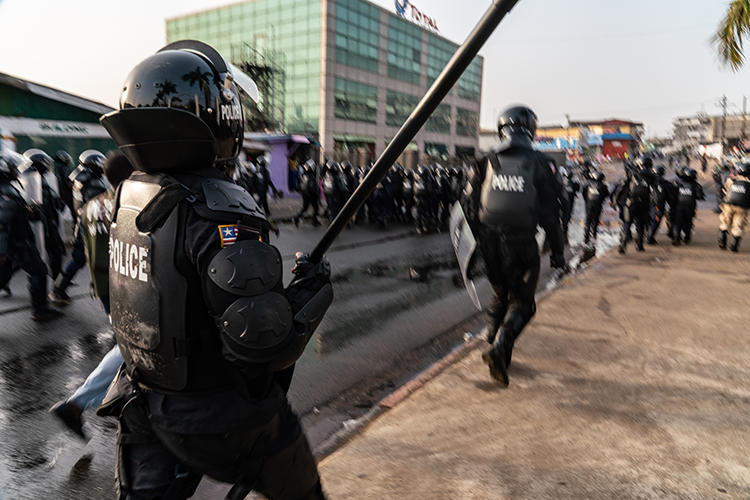Since March 19, 2020, Liberian security forces have attacked or intimidated at least four journalists covering the COVID-19 pandemic, according to the journalists, who spoke with CPJ in phone calls and via messaging apps, and a report posted on Facebook by the Press Union of Liberia, a local trade group.
On March 19, 20, and 21, authorities summoned Charles Bioma Yates, a publisher of the privately owned Integrity Watch Newspaper and a talk-show host on local broadcaster Super FM, for questioning at the office of Liberia’s National Security Agency in Monrovia, the capital, he told CPJ.
He was summoned over a post on his personal Facebook page, where he often posts political commentary and videos from his radio show, alleging corruption by the Liberian government and unequal application of quarantine rules for people coming to Liberia from abroad, according to Yates and news reports.
Yates told CPJ he was held for nearly six hours during each visit and he was questioned about his motives for being “critical of government.” He said he was released without charge, but National Security Agency officials told him to remain in Liberia while an investigation was pending.
Before the summons, on March 18, Yates said his neighbors told him that men in a black jeep had come to his neighborhood and asked about him and his family.
On March 20, a National Security Agency official called Joel Cholo Brooks, the publisher of the independent news website GNN Liberia, and requested that he reveal his source for a story he wrote about Liberia’s enforcement of social restrictions, Brooks told CPJ. He said he refused and has not been contacted again, but was concerned for his safety given the recent attacks on other reporters in Liberia.
On March 27, a group of officers from Liberia’s Drug Enforcement Agency attacked Frank Wornbers Payne, a reporter and producer with the privately owned Magic FM radio station, while he was reporting on compliance with government-mandated social distancing at a wake in Peachuzon, a community in Liberia’s coastal region, he told CPJ.
Payne told one of the agents that he was concerned by the crowd of over 50 people dancing, and a group of more than a dozen agents then slapped and kicked the journalist until his friends were able to help him escape, Payne said.
Payne told CPJ he filed a complaint with the local police station about the attack, and said the Justice Ministry had opened an investigation. Payne told CPJ on April 14 that the Justice Ministry said a report on the attack would be ready by April 17.
In that call, Payne said he was yet to resume work, and had been admitted at a local clinic for two days to treat injuries from the attack, including pains in his ribs and back, but was unable to afford x-rays recommended by the doctors.
On March 30, security officers attacked Molley Trojan Kiazolu, the radio director at the privately owned Fabrick FM broadcaster, as he tried to report live on a group of officers enforcing social distancing in Monrovia, he told CPJ.
Officers asked Kiazolu why he was recording the event, and one asked him to delete his footage, he said. When he said he could not delete the videos, because he was streaming live, one officer sprayed hand sanitizer in Kiazolu’s face and another seized his mobile phone, he said.
Kiazolu said his sunglasses prevented the sanitizer from damaging his eyes. He said that about four hours after the attack, he went to the police headquarters with Press Union of Liberia Vice President Daniel Nyakonah, and said the officers apologized and returned his phone.
Police spokesperson Moses Carter told CPJ via phone on April 10 that he did not know the details of the investigation into the attack against Payne and believed the matter involving Kiazolu had been settled.
Samuel K. Jacob, the head of joint security of the Grand Bassa county, where Peachuzon is located, and a spokesperson with the Ministry of Justice, did not respond to CPJ’s calls or messages for comment.
Liberian government spokesperson Smith Toby did not respond to CPJ’s calls and text messages for comment.
